In a primary election to choose candidates for the presidential elections scheduled for October, a far-right populist candidate shocked the political establishment by garnering the most votes.
Unofficial results showed that with almost 90% of votes tallied on Sunday, far-right libertarian economist Javier Milei received 30.5 % of the vote.
With 28%, the major conservative opposition group trailed the government Peronist alliance, which received 27% of the vote.
With inflation at 116% and a cost-of-living crisis putting four out of ten people in poverty, the results are a harsh rebuke to both the center-left Peronist alliance and the major Together for Change conservative opposition party.
After the results were in, Milei gave a confident statement in which he said, “We are the true opposition.” Repeating past mistakes will never lead to a different outcome in Argentina.
Because most people are required to vote in the primaries and each voter has a single ballot, the primary election serves as a kind of dress rehearsal for the general election on October 22 and provides a strong indication of who is the favourite to win the president.
As a result of the nation’s economic crisis, many Argentines have lost faith in the two major political parties, opening the path for Milei,
The 52-year-old lawmaker has declared that Argentina’s Central Bank should be disbanded and is a fan of former US President Donald Trump. He also claims that climate change is a hoax, labels sex education as an attempt to break up families, and promises to make it simpler to get weapons.
Party officials at Milei’s electoral offices in central Buenos Aires were thrilled as supporters partied outside, certain that their candidate’s popularity would only increase before the October election.
I’m happy because we need a change. Franco Lesertessur, 19, expressed frustration with the current situation, claiming, “We’re tired of living like this.” Countries that adopted the dollar saw economic growth and stabilisation.
Results “reflect people’s fatigue on the political leadership and the lack of solutions within the spaces that have been in power consecutively,” said Mariel Fornoni, director of political consultancy company Management and Fit.
The political elite, according to Fornoni, “focused on their own group dynamics rather than addressing the actual needs of the people” throughout the elections.
Together for Change, the largest opposition alliance, saw former Security Minister Patricia Bullrich soundly defeat a more centrist candidate, Buenos Aires Mayor Horacio Rodriguez Larreta. This result suggested that voters were also willing to go to the right.
Bullrich made it quite obvious that she will collaborate with her rival in the lead-up to October.
“As Argentines, we suffer daily; we are afraid; we cannot hope, make plans, or lead a normal life. Bullrich said that the current situation in Argentina provided “reasons to work together, to guide and lead a profound change that leaves corruption behind forever, paving the way for austerity.”
Meanwhile, voters punished the ruling Union for the Homeland coalition, sending it to a distant third place as a result of the dismal status of the economy.
In a landslide victory against his socialist opponent Juan Grabois, Economy Minister Sergio Massa was nominated as the coalition’s presidential candidate.
“We have 60 days to turn this election around,” Massa told his followers.
The primary election turnout on Sunday was the lowest in Argentina in the over a decade that they have been conducted.
The winner of the October election, or more likely the winner of a runoff election in November, will have to make crucial policy choices on the restoration of depleted foreign reserves, the expansion of grain exports, the management of inflation, and the gradual easing of currency controls.
A 58-year-old businessman named Jorge Boloco claimed that Argentina needs a “course into the future,” but that no political party has provided one.
After years of economic turmoil, Maria Fernanda Medina, a 47-year-old teacher, said she had lost some hope that politicians would actually deliver change.
“I don’t have much hope because, in every election, I feel a little disappointed,” she remarked as she voted in Tigre, a suburb of Buenos Aires.

